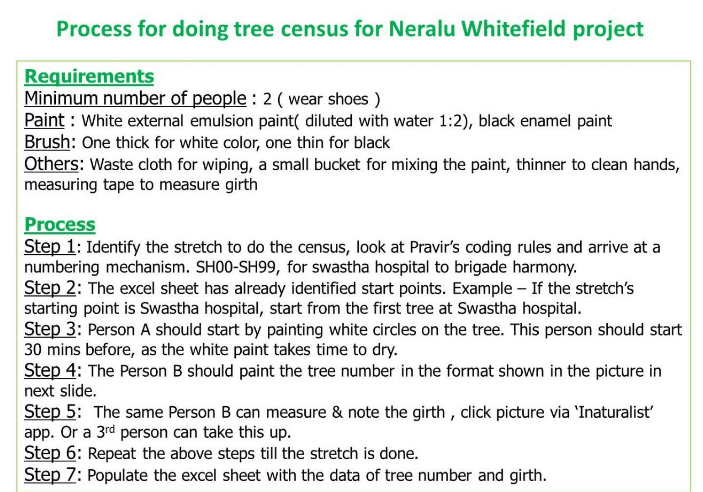In mid Feb 2019, we were shocked to observe a very old tree having been cut down on Whitefield Main Road. The construction behind seemed ominously like the reason for the felling. Having seen other beautiful old trees been felled as mercilessly, we decided to take action this time and filed a Case. Turns out that the Forest Department had themselves felled it citing disease. We had the well known Vijay Nishanth come and inspect the tree stump and declare that clearly this was not a diseased tree that needed cutting. We also investigated by asking people living right next to the tree if they observed any disease and they said no though we heard that a number of people had apparently requested the corporator to have the tree felled. All the reasons we got seemed flimsy.
This incident sparked the Neralu Project.
Trees are the lungs of mankind itself. They produce the oxygen we breathe taking in carbon dioxide in return. They are essential for our water as well as the birds, insects and other wildlife essential for our existence. As science progresses we are discovering the complex intelligence of trees, their abilities to communicate with each other staying in harmony with nature and keeping the balance. At the same time, we are also able to see the immensity of harm caused by the felling of trees. Trees and forests are disappearing contributing heavily to Global Warming. While world leaders grapple with bringing in policies to manage global warming, we “Neralu Mahadevpura” initiated by Whitefield Rising want to be the change we want to see and begin to address the felling of trees while growing as many more trees as we can.
Tree felling is easy as it turns out! And has always been so even though one must seek a permit from a Tree Officer. Around us we see trees felled overnight. Even worse, it doesn’t seem to trigger the reaction it should in the public! Trees take decades to grow old, spreading their trunks over a large surface area, becoming a host for many beings while sheltering and giving shade. Yet, overnight, they can be gone and no one reacts! And for the few who are vigilant, they are yet to be any significant deterrant to those that will fell the next tree. Another interesting observation is that Govt departments are themselves responsible for cutting many trees – and legally so. Permits are given easily and little can be done then to stop the felling. While there may be some compelling reasons to indeed cut some trees to allow for infrastructure development, it is the casual ease of allowing such a large harm that causes our worry. Balancing development with nature is crucial to our very existence and for the welfare of our children and grandchildren.
Objectives of Neralu Mahadevpura
- Initiate a census of trees across Mahadevpura
- Build awareness and pride in people wrt trees in their neighborhood
- Cultivate vigilance in citizens so trees cannot be easily cut overnight
- Take action on trees that are cut
- Identify opportunities to plant trees and enable plantings.
Method Currently Planned
- Identify Roads and volunteers to do a census on
- Use the iNaturalist App to take photos and document the tree – geo-tagging it
- Use a pre-planned numbering scheme to number the tree physically as well as record that number with the tree on the iNaturalist App
- Use this data to share information with the relevant departments if a tree is suddenly cut showing with evidence via photos that the tree was fine
- Use this data to build awareness that we have to take pride in our green cover, protect our trees and grow more trees

